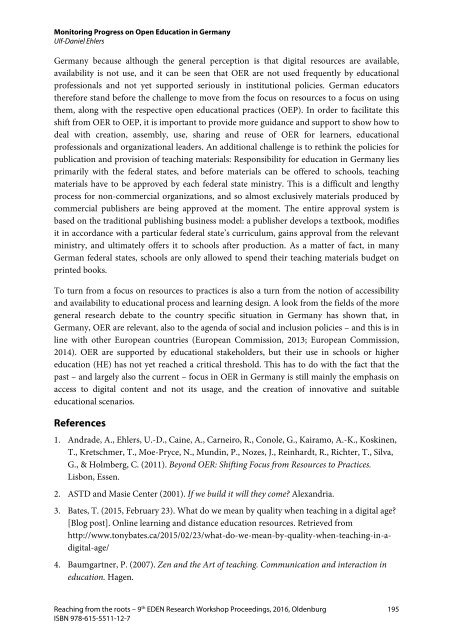Forging new pathways of research and innovation in open and distance learning
RW_2016_Oldenburg_Proceedings
RW_2016_Oldenburg_Proceedings
Create successful ePaper yourself
Turn your PDF publications into a flip-book with our unique Google optimized e-Paper software.
Monitor<strong>in</strong>g Progress on Open Education <strong>in</strong> Germany<br />
Ulf-Daniel Ehlers<br />
Germany because although the general perception is that digital resources are available,<br />
availability is not use, <strong>and</strong> it can be seen that OER are not used frequently by educational<br />
pr<strong>of</strong>essionals <strong>and</strong> not yet supported seriously <strong>in</strong> <strong>in</strong>stitutional policies. German educators<br />
therefore st<strong>and</strong> before the challenge to move from the focus on resources to a focus on us<strong>in</strong>g<br />
them, along with the respective <strong>open</strong> educational practices (OEP). In order to facilitate this<br />
shift from OER to OEP, it is important to provide more guidance <strong>and</strong> support to show how to<br />
deal with creation, assembly, use, shar<strong>in</strong>g <strong>and</strong> reuse <strong>of</strong> OER for learners, educational<br />
pr<strong>of</strong>essionals <strong>and</strong> organizational leaders. An additional challenge is to reth<strong>in</strong>k the policies for<br />
publication <strong>and</strong> provision <strong>of</strong> teach<strong>in</strong>g materials: Responsibility for education <strong>in</strong> Germany lies<br />
primarily with the federal states, <strong>and</strong> before materials can be <strong>of</strong>fered to schools, teach<strong>in</strong>g<br />
materials have to be approved by each federal state m<strong>in</strong>istry. This is a difficult <strong>and</strong> lengthy<br />
process for non-commercial organizations, <strong>and</strong> so almost exclusively materials produced by<br />
commercial publishers are be<strong>in</strong>g approved at the moment. The entire approval system is<br />
based on the traditional publish<strong>in</strong>g bus<strong>in</strong>ess model: a publisher develops a textbook, modifies<br />
it <strong>in</strong> accordance with a particular federal state’s curriculum, ga<strong>in</strong>s approval from the relevant<br />
m<strong>in</strong>istry, <strong>and</strong> ultimately <strong>of</strong>fers it to schools after production. As a matter <strong>of</strong> fact, <strong>in</strong> many<br />
German federal states, schools are only allowed to spend their teach<strong>in</strong>g materials budget on<br />
pr<strong>in</strong>ted books.<br />
To turn from a focus on resources to practices is also a turn from the notion <strong>of</strong> accessibility<br />
<strong>and</strong> availability to educational process <strong>and</strong> learn<strong>in</strong>g design. A look from the fields <strong>of</strong> the more<br />
general <strong>research</strong> debate to the country specific situation <strong>in</strong> Germany has shown that, <strong>in</strong><br />
Germany, OER are relevant, also to the agenda <strong>of</strong> social <strong>and</strong> <strong>in</strong>clusion policies – <strong>and</strong> this is <strong>in</strong><br />
l<strong>in</strong>e with other European countries (European Commission, 2013; European Commission,<br />
2014). OER are supported by educational stakeholders, but their use <strong>in</strong> schools or higher<br />
education (HE) has not yet reached a critical threshold. This has to do with the fact that the<br />
past – <strong>and</strong> largely also the current – focus <strong>in</strong> OER <strong>in</strong> Germany is still ma<strong>in</strong>ly the emphasis on<br />
access to digital content <strong>and</strong> not its usage, <strong>and</strong> the creation <strong>of</strong> <strong>in</strong>novative <strong>and</strong> suitable<br />
educational scenarios.<br />
References<br />
1. Andrade, A., Ehlers, U.-D., Ca<strong>in</strong>e, A., Carneiro, R., Conole, G., Kairamo, A.-K., Kosk<strong>in</strong>en,<br />
T., Kretschmer, T., Moe-Pryce, N., Mund<strong>in</strong>, P., Nozes, J., Re<strong>in</strong>hardt, R., Richter, T., Silva,<br />
G., & Holmberg, C. (2011). Beyond OER: Shift<strong>in</strong>g Focus from Resources to Practices.<br />
Lisbon, Essen.<br />
2. ASTD <strong>and</strong> Masie Center (2001). If we build it will they come? Alex<strong>and</strong>ria.<br />
3. Bates, T. (2015, February 23). What do we mean by quality when teach<strong>in</strong>g <strong>in</strong> a digital age?<br />
[Blog post]. Onl<strong>in</strong>e learn<strong>in</strong>g <strong>and</strong> <strong>distance</strong> education resources. Retrieved from<br />
http://www.tonybates.ca/2015/02/23/what-do-we-mean-by-quality-when-teach<strong>in</strong>g-<strong>in</strong>-adigital-age/<br />
4. Baumgartner, P. (2007). Zen <strong>and</strong> the Art <strong>of</strong> teach<strong>in</strong>g. Communication <strong>and</strong> <strong>in</strong>teraction <strong>in</strong><br />
education. Hagen.<br />
Reach<strong>in</strong>g from the roots – 9 th EDEN Research Workshop Proceed<strong>in</strong>gs, 2016, Oldenburg 195<br />
ISBN 978-615-5511-12-7


